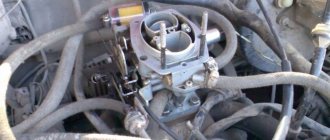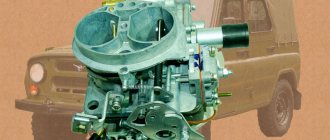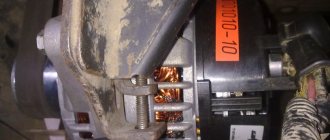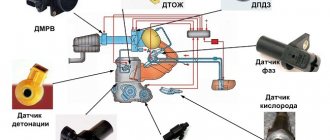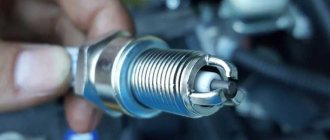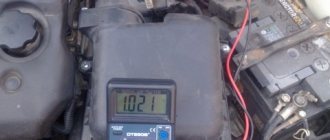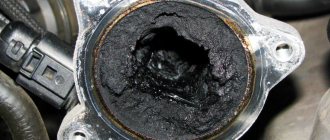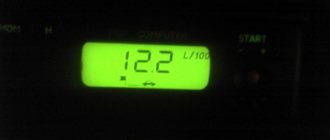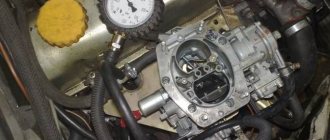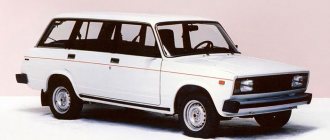The long-term experience of hundreds of thousands and millions of motorists shows that Russia is a special country. If there is a drop in oil prices in the world, then the price of gasoline also decreases. In the world, but not in Russia. In our country, any change in oil prices leads to higher prices for gasoline on the domestic market. In addition, in recent years, the average car owner has been forced to put up with traffic jams, in which fuel is wasted and equipment wears out.
Therefore, the issue of fuel economy is far from idle.
It is estimated that, depending on the driving method of different drivers in the same car, when driving along the same route, fuel consumption can vary by up to a quarter of the volume, that is, up to 25%.
For example, a trip to the Altai Mountains from Novosibirsk to the Chuyskaya steppe and back (2000 km) under such conditions will bring savings of about 1200 - 1300 rubles, which is absolutely not bad.
The newspaper “Arguments and Facts” presented an interesting infographic on this topic.
Now let’s look briefly at well-known (and not so well-known) ways to save fuel that a driver can adopt. Let’s arrange them in order of decreasing effectiveness and “testing by popular experience.”
Secondly, the one between the steering wheel and the seat. Engine faulty
On the highway at a speed of 90 km/h, cars with a 4-speed gearbox require about 8 liters of gasoline; when using a 5-speed unit, fuel costs drop by 0.5-0.7 liters. Not only are they unable to increase the efficiency of the motor to the desired values, if it were true, such a device would have long been patented, and its most active consumers would have been the aviation and cargo transportation industries, they are simply dangerous to the life of the driver, since they are capable of damage the entire fuel system or, even worse, disrupt the operation of the engine while driving.
| Engine | Consumption (highway) | Consumption (city) | Consumption (mixed cycle) |
| 1.3 l 4-mech (gasoline) | 7.8 l/100 km | 11.5 l/100 km | 10.5 l/100 km |
| 1.4 l 5-mech (gasoline) | – | 9 l/100 km | – |
| 5.2 l/100 km | 8.9 l/100 km | 7 l/100 km | |
| – | 8.5 l/100 km | – | |
| 9.5 l/100 km | 12.5 l/100 km | 11 l/100 km |
Advice on the full consumption of the air-gasoline mixture
Rationale : check the spark plug gap in a timely manner, which should be about 1 mm, and also change the spark plugs after a certain mileage of the car. So, many spark plugs need to be replaced after a run of 50-60 thousand km. An obvious “plus” will be the good appearance of the candles, since it is difficult to notice tangible savings from this one rule. Not everyone is able to “throw away” an apparently normally working spark plug, much less the entire set. Many people wait until the candles become unusable. "Human factor".
Disadvantages : small additional cost of money
Fuel consumption of VAZ 2107 (injector). Engine faulty
| How to reduce fuel consumption on a VAZ 2107 carburetor. Gasoline consumption 2107 per 100 km, regardless of the kilometers traveled at normal vehicle speed, also depends on the quality of the fuel, so try to purchase it at large network gas stations. Slightly reduced compression pressure in the cylinders, which is practically not felt in the dynamics of the car, but can increase fuel consumption from 1 to 5 liters. |
- To restore the mesh filter, the following procedures must be performed. To do this, use a fuel pump, that is, pump the carburetor until the shut-off valve closes. After this, it must be dismantled and washed with solvent and dried thoroughly. It is also worth considering here that if dips appear, this may result in a loss of power.
- Now they begin to clean the float chamber, for this they use a regular rubber bulb. And after washing, the device must be dried, and you cannot use rags for wiping, as lint remains. And there are situations when the jets become clogged.
- Don’t forget to check the locking needle; it can also be cleaned using a blower. This procedure is performed by ear to determine if there are any air leaks; if a problem is identified, it is better to immediately replace the valve body or the needle itself.
- To adjust the float system, you need to check its position; if it is displaced, you can move it a little using a special holder. But to do this, first check that the needle valve is closed. After this, you can set the float and hatch gasket. It is best to achieve a resolvable size of 15 mm. All these procedures can be carried out either with the carburetor removed or repaired on the car.
- Now you need to adjust the starting system, in this case the air filter is also removed, start the engine and remove the choke, but not much. As previously mentioned, up to 3.5 thousand revolutions.
- Next comes the idle speed adjustment, that is, the quality screw, first tighten it completely, and then make several turns clockwise. Then the engine is warmed up to the required procedure and the choke is completely removed, and listen to how the engine works. If it starts to stall, then the quality screw should be turned a little in the opposite direction. The main thing to remember here is that all work with the screws should be carried out when the car is idling, otherwise the throttle valve will begin to open.
Model VAZ 2104 • 6 l these figures are respectively equal to 6.
Monitor your engine speed
Rationale : do not allow the tachometer to “dance” when changing gears above 2 thousand revolutions, and change gears earlier, do not “overdrive” before shifting to 3-4 thousand revolutions.
Disadvantages : the advice is universal, but it reduces acceleration dynamics, which is not always acceptable at congested traffic lights. In addition, early upshifts require at least a 16-valve engine.
Reasons for high fuel consumption on the injector
New cars that are controlled by a single electronic control unit (ECU) are also not ideal. Let's look at what can cause high fuel consumption on an injector. There are several reasons:
1. Malfunctions in the engine control system. Electronics have significantly simplified the life of a car enthusiast and at the same time added headaches. What does it mean?
Faulty sensors inevitably lead to increased fuel consumption, so you need to pay special attention to them.
Now a large number of sensors are responsible for the condition of the machine, which can break or malfunction. As a result, the ECU does not respond correctly to signals and gives incorrect commands.
The following may lead to increased consumption:
- Temperature sensor failure.
- Throttle position. .
- Or mass air flow.
2. Incorrect pressure in the fuel system. In particular, reducing this parameter is very dangerous when the engine significantly loses power, and on cars with automatic transmission the engine operating time at high speeds increases.
3. Injector failure. Against the backdrop of far from the highest quality fuel, the car’s injector itself can fail. If you start the problem, then over time the engine power will decrease, the engine will start to stall and stall.
The main cause of such troubles is clogged injectors. In this case, only cleaning can help out.
Know how to use a gearbox
Rationale : remember a simple formula: in 1st gear start from a standstill, for acceleration there is 2nd gear, for afterburner and overtaking - 3rd, in 4th gear move around the city, and in 5th gear you can switch to the highway. The advice is also universal in nature, but is only suitable for “mechanics”.
Disadvantages : the negative point is a long drive in 5th gear, since, in accordance with the first rule, fuel consumption in it is the highest.
Checking the fuel jet • Faulty injector
| Fuel consumption of the VAZ-2107 - official and real indicators The popular domestic car VAZ 2107, commonly known as the Seven, is still successfully operated in Russia and is not a type of car that consumes excessive gasoline. The degree of cooling, and, consequently, the amount of air passed, can be determined by the difference in the resistance of the two threads; the larger the volume of air passes, the more the conductor is cooled and the more its resistance decreases. |
| Why does my car have high fuel consumption and how can I reduce it? | VAZ 2107 classic It is worth noting that this driving style is unsafe if the engine stalls, the vacuum brake booster stops working, and braking efficiency will noticeably decrease, which can lead to an emergency. The fuel consumption of the VAZ 2107 is quite moderate, and according to this parameter the car can be considered for purchase, however, many reasons depend on how quickly the gasoline leaves the tank, including driving style. |
Fuel consumption of a VAZ-2107 on a carburetor car • To ensure that the RT is not too high, first of all it is necessary to monitor the technical condition of the car.
Race for the leader, or know how to use “low pressure pockets”
Rationale : a very good method when driving behind large objects: buses, tractors in a low-pressure zone - no further than 4 - 5 meters from the “leader”. This method is good for leisurely driving at a constant speed in general traffic, as it allows you to save fuel very well - from 20 to 40%.
Disadvantages : the method is quite dangerous due to non-compliance with the distance, suitable for experienced drivers in certain areas of suburban traffic.
Fuel consumption VAZ 2107 (carburetor)
AvtoVAZ managed to release 4 variations of the carburetor “seven” with engine capacities of 1.2, 1.3, 1.5 and 1.6 liters. The larger the engine size, the more gasoline it will burn. Thus, the one and a half liter engine burns 6.8 l/100 km when driving on the highway and 9.6 l/100 km during city trips. For a VAZ 2107 with a 1.6 liter engine, these figures are respectively 6.9 and 10.2 l/100 km. Cars with 1.2 and 1.3 liter engines are more economical, but not as popular due to less power. It is worth noting that the fuel consumption of a VAZ 2107 (carburetor) with a four-speed gearbox is higher than that of a similar model with a five-speed gearbox.
The injection “sevens” were equipped with 3 engine options, and one of them differed only in the degree of compliance with environmental standards: 1.5 l, 1.6 (euro-2) and 1.6 (euro-3). Installing an injector did not significantly reduce fuel consumption. The injection system had a greater impact on power and dynamics. Fuel consumption of a VAZ 2107 (injector) with a 1.6-liter engine is 7.3 and 9.7 l/100 km when driving on the highway and in the city, respectively. This is slightly less than its carburetor counterpart. If we take into account that the injector is more “capricious and finicky” in terms of fuel quality and settings requirements, then the advantage in fuel consumption is completely leveled out. How can you reduce the fuel consumption of a VAZ 2107? All advice can be divided into two groups: real, which bring practical benefits, and dubious, which only benefit sellers of “smart” devices for reducing fuel consumption. First, about the “good”, that is, about the correct and effective methods of saving.
Economy driving skills
Drivers are taught proper driving techniques at a driving school. When operating the domestic “classic” VAZ 2106, you need to take into account a number of points:
- The first gear of the car is quite “short”. You shouldn’t rev the engine too hard; once you’ve started moving, go to second speed.
- Frequent sudden accelerations and stops are a real scourge for any car; along with excessive consumption of gasoline, the wear of parts and components accelerates. Move more calmly, try to stop as little as possible, use the inertia (rolling) of the car.
- On the highway, maintain cruising speed at all times. The optimal value for the “six” with a four-speed gearbox is 80 km/h, with a five-speed gearbox – 90 km/h.
- When coasting down a mountain, do not turn off the speed - brake the engine and watch the tachometer. When the needle drops below 1800 rpm, shift to neutral or low gear.
- In a city traffic jam, don’t turn off the engine in vain. If the idle time does not exceed 3-4 minutes, stopping and starting the engine will “eat up” more fuel than idling.
Moving along busy city streets, experienced drivers monitor the signals of distant traffic lights. If you can see a green light in the distance, there is nowhere to rush - by the time you get there, you will come under a red one. And vice versa, if you notice a red signal, it is better to speed up and drive under the green one. The described tactics allow the motorist to stop less at traffic lights and thus save fuel.
Against the backdrop of rising fuel prices, driving outdated cars becomes doubly expensive. The “six” needs to be constantly monitored and repaired on time, so as not to pay extra money for gasoline. Aggressive driving is not at all compatible with carburetor “classics”, where the power of the power unit does not exceed 80 hp. With.
All carburetors manufactured on the plant's assembly line always undergo careful control. However, despite strict control, it is difficult to obtain similar characteristics of carburetors, because it is very expensive for mass production. As a result, carburetors differ in fuel mixture consumption by eight percent, and they differ from each other by sixteen percent.
Adjustment for low fuel mixture consumption
By adjusting the metering systems in operation, you can reduce fuel consumption on many carburetors. To do this, you need to combine the adjustment in the first chamber of the metering system, and then adjust the system; after idling, you need to open the secondary chamber and, under heavy loads, check the operation of the carburetor.
By combining the adjustment of the metering system with an enlarged air jet, it is possible to avoid making fuel jets with lower capacity. Sometimes you can simply make the cross-section of the air jet larger for carburetors 2105 from 1.7-1.9 millimeters, 2107 from 1.5-1.7 millimeters.
If, after the air jet has been enlarged, during smooth acceleration of the car in direct gear at a speed of sixty kilometers per hour with the opening of the primary chamber, the crankshaft rotation speed increases and there is a visible delay. If the owner is sure that the accelerator pump is working properly, then the air jet needs to have a smaller cross-section by 0.05 millimeters or 0.1 millimeters.
When starting smoothly, while driving in low gears and at minimum speed, do not pay attention to the formation of jerks and dips. It is necessary to select the adjustment of the dosing system, begin adjusting and diagnosing the XX system
The purpose of adjusting the XX system is to ensure a lean mixture composition in transition mode, at low speed. If the edge of the throttle valve is located near the vias, then the fuel mixture flows through the vias. At idle, you can make a fairly accurate adjustment using a simple tachometer
It is necessary to select the adjustment of the dosing system, begin adjusting and diagnosing the XX system. The purpose of adjusting the XX system is to ensure a lean mixture composition in transition mode, at low speed. If the edge of the throttle valve is located near the vias, then the fuel mixture flows through the vias. At idle, you can make fairly accurate adjustments using a simple tachometer.
TPS (Throttle Position Sensor)
It is installed on the side of the throttle itself and on the same axis with the throttle valve. Reads readings of opening or closing, respectively, pressing the gas pedal.
At one time there were many fakes that did not last even a month, so you should choose time-tested ones, preferably those that were installed at the factory. There were also cases when they were knocked down or broken by a high-pressure jet at car washes. If these rules are taken into account, they can live quite a long time.
Malfunctions: Dips appear when pressing the gas pedal. Increase in speed (for no reason) at idle. Jerks and dips under load
Cost about 250 – 350 rubles with diagnostics
If you are confident in the road and weather conditions, use the “coast” when descending
Rationale : when the car uses only idle speed when driving downhill, the fuel savings are quite noticeable.
Disadvantages : the danger lies in the fact that there is no stabilizing drive, especially during sharp braking in neutral gear. But when there is a good road ahead, a minimum of traffic, and a dry road surface, you can use this method.
1.7 liter injector
Starting in 2006, for the domestic market, the seventh model began to be equipped with a 1.6 liter engine with forced injection, which complied with Euro-2 standards. So, for example, if you drive in a city where you have to constantly accelerate, slow down or brake, stand at traffic lights or even spend hours in traffic jams, then your gas mileage will be much higher than if you drive outside the city on a straight road without any traffic jams or stops. .
Do not overuse the lowering of the windows
Rationale : an open window creates a zone of air turbulence, which can slow down slightly, increasing gasoline consumption by 1-2%.
This may not be much, but when there is wind at high speed, other troubles may appear: exacerbation of cervical osteochondrosis (if it blows out) or a cigarette may be “blown out” into the back seat with the risk of a fire.
Disadvantages : in the summer heat on a VAZ 2107, this advice cannot be applied due to the lack of air conditioning in the cabin.
Damaged or leaking connections in the fuel line: Engine is faulty
EPHH is designed to cut off the fuel supply while the car is moving with the gas pedal released and the gear engaged; it is also called engine braking mode or forced idle. It is not for nothing that the manufacturer indicates in the car manual the recommended ignition timing angle UOZ, since it ensures engine operation in optimal mode.
| Model | Consumption (highway) | Consumption (city) | Consumption (mixed cycle) |
| VAZ 2107 – injector | 7 l/100 km | 11.5 l/100 km | 8.5 l/100 km |
Change the air filter promptly
Rationale : the advice is simple and effective, and has no downsides. Just remember that a sufficiently old and dirty air filter can increase fuel consumption by up to 10%. The more loaded the car, the more pronounced is its need to obtain a high-quality mixture. Therefore, every 20-25 thousand km, change the air intake in a timely manner.
Disadvantages : none. Is it just an additional expense of 200 rubles over the course of a year and an extra 5 minutes of wasted time?
Common “myths” about fuel economy... Carburetor is faulty
| Reasons for high fuel consumption It is estimated that, depending on the driving method of different drivers in the same car when driving along the same route, fuel consumption can vary by up to a quarter of the volume, that is, up to 25. Sometimes some car owners have a worn-out engine in their car, they try to increase its power by deliberately setting the carburetor air damper cover, thus forcibly enriching the fuel mixture and slightly increasing engine traction and power. |
| How to reduce fuel consumption on a VAZ 2107 carburetor If the thermostat of the cooling system is constantly open, the liquid will move around a large cooling circle, and this in turn will lead to incomplete warming up of the engine, loss of power and increased fuel consumption. The palm belongs to the anti-advice, which may interest the car owner right now is the use of cheap types of gasoline instead of expensive ones or those recommended by the manufacturer. |
- urban mode - 8.5 l;
- 90 km/h – 6.9 l;
- 120 km/h – 9.2 l.
Aerodynamics of the car
Many Russian drivers have already noticed that the fifth model has much lower consumption due to its aerodynamic properties. We are talking about a radiator grille that is flush with the hood, and does not stick out, as on the seven. The high “nose” of the grille creates additional air resistance, which leads to excessive fuel consumption. In this case, it is recommended to install the hood and grille from the VAZ 2105.
The second reason is a roof rack that has too much protruding cargo. Tall suitcases, boxes and other items carried on the roof also make it difficult for the vehicle to move, causing the engine to consume much more gas than it should. The best way out of the problem is a trailer that hides behind the car, is lightweight and can hold more cargo than a trunk.
Open windows when driving on the highway also interfere with normal gasoline consumption. If the car is hot, you can use central air ducts, which open at speed and set the flow of cold air, which is much more convenient and economical.
Choose the right engine oil
Rationale : if you use oil with a reduced viscosity, then fuel consumption decreases as the resistance decreases. Oil viscosity depends on temperature, and it is the loss of viscosity that causes the engine to “seize”
Disadvantages : none
You can see additional recommendations by looking at another infographic:
“Cut” a tight turn
Rationale : if the road situation allows, prepare for the turn in advance and drive it in a straight line, like racing drivers, since a straight line is the shortest distance between two points. The advantage of this advice is that for every 1000 km of a long road, you can save 20 km by maneuvering in this way.
Disadvantages : the disadvantage is that movement must be allowed, and this method must be brought to automaticity, since preparation is needed for the car to hit the desired point before starting the turn, which will allow it to move in a straight line.
Related material:
How to adjust idle speed
